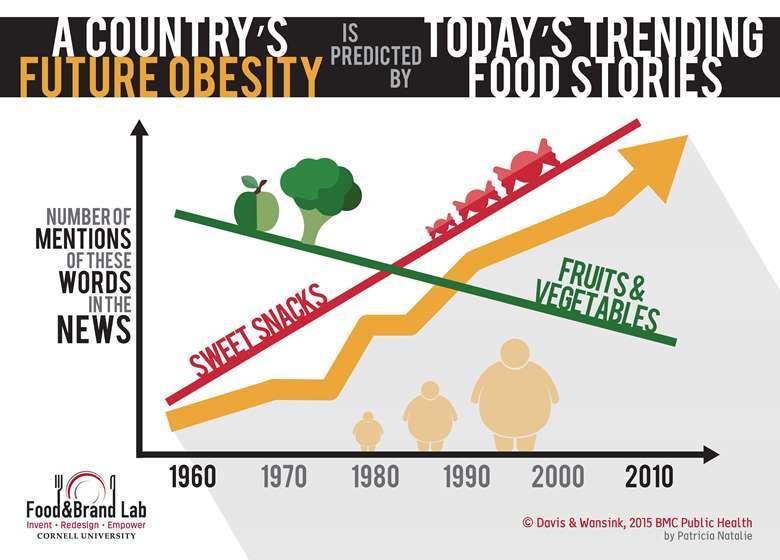Future obesity is predicted by today's trending food stories

What you're reading now secretly tells you whether your country will be skinnier or fatter in three years. After analyzing 50 years of all the food words mentioned in major newspapers like the New York Times and London Times, a new Cornell study shows that the food words trending today in 2015 will predict a country's obesity level in three years - in 2018.
"The more sweet snacks are mentioned and the fewer fruits and vegetables that are mentioned in your newspaper, the fatter your country's population is going to be in 3 years, according to trends we found from the past fifty years," said lead author, Brennan Davis, Associate Professor of Marketing from California State University at San Luis Obispo. "But the less often they're mentioned and the more vegetables are mentioned, the skinnier the public will be."
This study, published in the journal BMC Public Health, analyzed all of the different foods mentioned in stories in the New York Times (and London Times) and statistically correlated them with each country's annual Body Mass Index, or BMI, a measure of obesity. While the number of mentions of sweet snacks were related to higher obesity levels 3 years later, the number of salty snack mentions were unrelated. The number of vegetable and fruit mentions were related to lower levels of obesity three years later.
"Newspaper's are basically crystal balls for obesity," said coauthor, Brian Wansink, Professor and Director of the Cornell Food and Brand Lab and author of the book, Slim by Design: Mindless Eating Solutions for Everyday Life. "This is consistent with earlier research showing that positive messages— 'Eat more vegetables and you'll lose weight,'—resonate better with the general public than negative messages, such as 'eat fewer cookies.'"
Predicting a country's obesity levels in three years might be easily done today using a newspaper. These findings provide public health officials and epidemiologists with new tools to quickly assess the effectiveness of current obesity interventions. If we wish to estimate obesity rates in three years, the best indicator will be what is mentioned in the paper today.
More information: Davis, Brennan and Brian Wansink (2015). Fifty Years of Fat: News Coverage of Trends that Predate Obesity Prevalence. BMC Public Health. DOI: 10.1186/s12889-015-1981-1


















